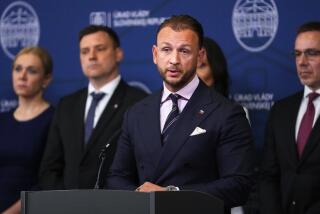No Fast Fix in Quest to Oust Milosevic
SARAJEVO, Bosnia-Herzegovina — In the view of President Clinton and most Western leaders, the problem behind the death and destruction that have ravaged the Balkans during this decade is simple: Yugoslav President Slobodan Milosevic.
And unless Milosevic is removed from power by the intensifying NATO bombardment, virtually all who have analyzed his bloody march to power agree, there is no hope of halting the violence and suffering that afflict the region.
But how and when the mastermind behind the mayhem in the Balkans will make his exit are questions of intense debate and broad disagreement.
Milosevic could be blasted out of a bunker by an alliance “smart bomb,” and, like Adolf Hitler, become the victim of his own suicidal defiance, forever relegated to an abyss of shame for making his nation an international pariah.
If he survives the NATO offensive, which many critics fear is likely, he could continue his rule for years but be haunted by the prospect of being brought to justice for crimes against humanity, like former Chilean strongman Gen. Augusto Pinochet.
There is also the theory that Milosevic could meet the same end as did Romanian dictator Nicolae Ceausescu, a seemingly untouchable tyrant who was toppled and executed in December 1989, when Romanians despaired of their own misery as all around them in Eastern Europe were embracing a new era of democracy and hope.
Many, though, foresee a Saddam Hussein-type scenario in besieged Yugoslavia, with Milosevic gaining strength as the valiant defender of his victimized nation under attack by the world’s most powerful military alliance.
Rather than encountering the fitting justice dealt Hitler, Ceausescu and Pinochet, however belatedly, Milosevic could end his days in comfortable old age and still in absolute power, as did the man who was arguably this century’s greatest dictator, Soviet leader Josef Stalin, who died in his sleep at age 73.
A master tactician who knows exactly how far he can go before making a concession, Milosevic can be expected to somehow slither out of the North Atlantic Treaty Organization’s noose to threaten peace elsewhere in the future, say analysts in this city that was savaged by an earlier conflict instigated by the Yugoslav strongman.
“Milosevic always survives by playing with the rules,” said Jakob Finci, director of the Soros Foundation’s Open Society Fund, which is working to restore democratic institutions in postwar Bosnia. “He will find some way of accepting what he earlier rejected, as he first opposed [Organization for Security and Cooperation in Europe] monitors in Kosovo, but then agreed when they were reinvented as ‘verifiers.’ ”
Finci expects Milosevic to agree to a U.N. protectorate status for Kosovo when a pause in the bombardment can be arranged, and thus remain in power and perhaps even strengthened by popular anger surrounding the loss of the province Serbs regard as the crucible of their kingdom.
“He is well protected, and it will never be easy to catch him,” Finci said. “But after what has happened in Kosovo, he will be indicted in The Hague [seat of the International Criminal Tribunal for the Former Yugoslavia], and even Russia could not oppose that. It’s clear after Pinochet that there are no safe havens for tyrants.”
“He’s got to go,” said Charles Forrest, a Balkans expert representing the American Bar Assn. in Sarajevo. “He started something here that can only end with his removal, unless we get a Saddam situation with a lunatic in the middle of Europe.”
Unfortunately, Forrest concedes, the example of Hussein’s being left in power in Iraq despite the ferocious Desert Storm assault of 1991 and repeated Western bombardments since then suggests that Milosevic might also survive to wreak havoc another day.
“I don’t see his own people taking him out; he’s wildly popular,” said Forrest, who served with the U.N. peacekeeping mission in Bosnia in the mid-1990s. “But we’ve so demonized Milosevic, he cannot be a party to future negotiations. Who could ever sit down with him and negotiate a deal?”
Some analysts see the potential catalyst for a military coup planted in the Yugoslav military ranks by the constant denunciations of Milosevic by Clinton and other leaders who contend that NATO is directing its firepower against the Yugoslav president and not the Serbian people.
“It wouldn’t be the first time in Serbian history that some kind of international signal has been sent to prompt young officers to throw the king out of the window,” said human rights activist Zdravko Grebo, director of the Sarajevo Law Center.
In 1903, young officers of the notorious Black Hand faction stormed the Royal Palace in Belgrade, the Serbian and now the Yugoslav capital, and killed King Alexander Obrenovic and his wife, Queen Draga, then threw their bodies out the palace windows. The revolt was believed to have been encouraged by Russia, which feared that Obrenovic was moving Serbia too close to the Austro-Hungarian Empire.
Like other analysts of the conflict that still percolates in Bosnia beneath a tenuous international peacekeeping force, Grebo insists there is no chance for real stability in the Balkans so long as Milosevic rules.
He is skeptical that the NATO assault will succeed in eliminating Milosevic and worries that leaving him in power after restoring order in Kosovo with an international troop deployment would allow Milosevic to turn his provocations toward other neighbors. But from a legal point of view, the action should come from the Yugoslav citizens who elected Milosevic, said Grebo.
“They say the Serbs are now united behind Milosevic as never before, but so were the Romanians behind Ceausescu,” said Haris Silajdzic, one of the three Bosnian prime ministers. He predicts that support for the Belgrade regime in the wake of the NATO actions will be eroded by popular resentment of the miserable aftermath.
Moderate Serbs, such as Mirko Pejanovic, president of the Serbian Civic Council in Bosnia, think the most likely way for Milosevic to be driven from office would be for him to be indicted in The Hague for war crimes and forced into hiding.
“We can look to the example of [wartime Bosnian Serb leader] Radovan Karadzic: As soon as he was declared a war criminal, he had to leave his public positions,” Pejanovic said. “The biggest problem with Milosevic is that the West can’t see who else to deal with. But if Milosevic were to be discredited with an indictment, someone else would come forward to negotiate.”
Average Bosnian citizens likewise predict that removing Milosevic from the limelight with a war crimes indictment would eventually weaken his position among the Yugoslav people, who would one day turn on him for orchestrating their isolation and poverty.
“The tragedy now is what Milosevic is doing to his own people,” said Mirzo Kitic, a construction engineer who recently returned to Bosnia after taking refuge in Germany for eight years. “Everything is destroyed there. No one has work, and the belligerent slogans will soon sound hollow. What simple people in Serbia want is a smart leader, not an idiot who thinks he can take on the whole world.”
More to Read
Sign up for Essential California
The most important California stories and recommendations in your inbox every morning.
You may occasionally receive promotional content from the Los Angeles Times.











